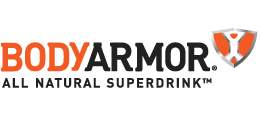Billion dollar sportswear and sneaker manufacturer Under Armour recently filed a trademark infringement lawsuit accusing Maryland-based startup beverage company BodyArmor of copying Under Armour's name, logo and marketing. Here are a few observations about this particular lawsuit.
First, purely from a marketing and promotion standpoint, the filing of this case was probably the greatest gift that the startup beverage maker could have possibly received from anyone.
Indeed, the opportunity to generate and benefit from massive amounts of free press was capitalized upon by BodyArmor's owners -- the same mega-entrepreneurs who founded vitamin water, sold that brand to the Coca-Cola Company in 2007 for $4.1B, and who are considered leading experts at creative brand building in the beverage industry.
In fact, normally filing an Answer to a Complaint is a fairly mundane procedural act, as an Answer typically contains standard denials, recitations and defenses, but little fireworks or rhetorical opportunities.
In fact, normally filing an Answer to a Complaint is a fairly mundane procedural act, as an Answer typically contains standard denials, recitations and defenses, but little fireworks or rhetorical opportunities.
However, seizing the moment and a unique opportunity for using litigation as part of brand building, BodyArmor issued an unusual, nationwide press release along with the filing of its Answer, threading populist themes of "fighting back against trademark bullying," a refrain often cited by accused infringers today.
 In its Answer, the Defendant countered by alleging that "[i]t is nearly impossible that consumers or retailers of either brand would confuse the two. Under Armour and BODYARMOR operate in disparate industries, produce distinctly unrelated products, and share no branding or logo similarities."
In its Answer, the Defendant countered by alleging that "[i]t is nearly impossible that consumers or retailers of either brand would confuse the two. Under Armour and BODYARMOR operate in disparate industries, produce distinctly unrelated products, and share no branding or logo similarities."
Nonetheless, despite the rhetoric of "bullying" and personalities involved, the merits of the trademark case require a fairly garden variety legal analysis.
The case will turn on the jury evaluating existing marketplace conditions, and determining whether or not consumer confusion is likely based on perceptions of the beverage's name, logo and marketing materials.
The case will turn on the jury evaluating existing marketplace conditions, and determining whether or not consumer confusion is likely based on perceptions of the beverage's name, logo and marketing materials.
To ultimately prevail on its trademark infringement claims, Under Armour will need to demonstrate to a jury, by a preponderance of the evidence, that ordinarily prudent consumers encountering the BodyArmor product and advertisements in the marketplace will likely be confused into believing that the beverage emanates from, is endorsed, sponsored by, or affiliated with Under Armour.
This analysis involves using a flexible eight-factor test called the Polaroid test first articulated by Judge Friendly in a famous case brought by Polaroid against a company called Polarad Electric.
The eight factors described in the Polaroid case are: the strength of the trademarks involved, the proximity of the products in the marketplace, the likelihood that the second-comer will "bridge the gap" in the marketplace between himself and the senior user, the sophistication of the consumers, any instances of actual confusion, the quality of the junior user's products, the intent of the junior user, and the similarity of the competing marks.
This analysis involves using a flexible eight-factor test called the Polaroid test first articulated by Judge Friendly in a famous case brought by Polaroid against a company called Polarad Electric.
The eight factors described in the Polaroid case are: the strength of the trademarks involved, the proximity of the products in the marketplace, the likelihood that the second-comer will "bridge the gap" in the marketplace between himself and the senior user, the sophistication of the consumers, any instances of actual confusion, the quality of the junior user's products, the intent of the junior user, and the similarity of the competing marks.
Further, marshaling evidence will entail the parties introducing competing consumer surveys through expert witnesses, who are skilled professionals with advanced marketing degrees and backgrounds, charging hundreds of dollars per hour.
Each expert witness will presumably challenge aspects of the adversary's expert's methodology and reach the exact opposite conclusion about the likelihood of confusion.
Each expert witness will presumably challenge aspects of the adversary's expert's methodology and reach the exact opposite conclusion about the likelihood of confusion.
The parties and their witnesses will also spend countless hours scrutinizing the respective trademarks bit by bit, comparing them side-by-side, as well as examining the appearance of the respective products themselves.
But in the end, when all the rhetorical fireworks are over, and the allegations of "fighting back against bullying" die down, the case will ultimately be decided based upon whether the jury believes that Under Armour has sustained its burden of proving that consumer confusion from the beverage is likely under prevailing marketplace conditions.
But in the end, when all the rhetorical fireworks are over, and the allegations of "fighting back against bullying" die down, the case will ultimately be decided based upon whether the jury believes that Under Armour has sustained its burden of proving that consumer confusion from the beverage is likely under prevailing marketplace conditions.


